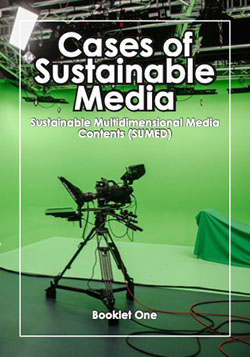Sustainable Multidimensional Media Contents
E-booklets
The SUMED consortium has created three booklets based on collected documentations, joint planning, and shared experiences stemming from the project. You can download the three booklets in .pdf format here.
1) Leading change for sustainability in media organisations
In the booklet, we share our experiences in collecting knowledge from the working life to map the needs for curricula development. In the constantly changing media formats, tools, and methods makes integrating sustainability a challenging task. We share our vision on the development of new and improved curricula and courses that will contribute to local communities and organizations and support the skills of their new employees.
We also ask: are carbon consciousness, constantly changing media, and sustainable working methods acknowledged in both working life and higher education institutions? What are the various ways of adapting to them? And we provide the answers too.
2) Sustainability in media curriculum
The second edition of the digital publication focuses on sustainable media production and education. Building on its initial work, "Leading Change for Sustainability in Media Organizations," the publication stresses the importance of promoting equality and creating safe spaces for sustainability discussions in educational settings.
Key to this initiative is empowering both students and teachers to engage with sustainability confidently. Research projects such as "New Excellence for Teachers: Teacher Training" highlight the importance of educating teachers on sustainability and providing them with resources to incorporate sustainable practices into their teaching.
3) Sustainable Ways of Media Content Creation The third and final booklet in the series presents a comprehensive overview of the SUMED project’s efforts to integrate sustainability and well-being into media education. The project recognises the critical role that media professionals and institutions play in shaping public narratives and cultural values amid ongoing environmental and social challenges. In response, SUMED supports the development of future media practitioners by equipping them with the knowledge, skills, and ethical grounding necessary to address these challenges through their work. The articles collected in this booklet reflect the varied dimensions of sustainability within media practice and education, offering both conceptual foundations and applied approaches. Each contribution examines a different aspect of sustainable practice—from institutional communication and curriculum design to emotional well-being in creative work—revealing the breadth and complexity of sustainability within contemporary media landscapes.
The third and final booklet in the series presents a comprehensive overview of the SUMED project’s efforts to integrate sustainability and well-being into media education. The project recognises the critical role that media professionals and institutions play in shaping public narratives and cultural values amid ongoing environmental and social challenges. In response, SUMED supports the development of future media practitioners by equipping them with the knowledge, skills, and ethical grounding necessary to address these challenges through their work. The articles collected in this booklet reflect the varied dimensions of sustainability within media practice and education, offering both conceptual foundations and applied approaches. Each contribution examines a different aspect of sustainable practice—from institutional communication and curriculum design to emotional well-being in creative work—revealing the breadth and complexity of sustainability within contemporary media landscapes.

Views and opinions expressed are however those of the author(s) only and do not necessarily reflect those of the European Union or Fundacja Rozwoju Systemu Edukacji. Neither the European Union nor the granting authority can be held responsible for them.
© SUMED 2026




